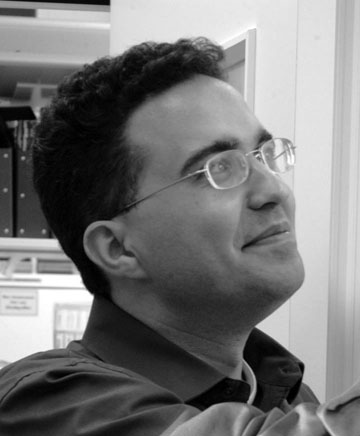To America and back … interview with Michael Boutros

After receiving his PhD from EMBL in 1999, EMBL alumnus Michael Boutros followed a road less traveled. He went to Harvard’s prestigious Kennedy School of Government to do a two-year masters degree in Public Administration. After that, he headed back to the bench, and in 2003 he returned to Heidelberg to head up a lab at the German Cancer Research Center.
You took an unusual step in your career after EMBL. Why?
The idea to go to the Kennedy School originated from my time at EMBL. I was involved in many Science and Society activities during my PhD, and this planted the seed in my mind of doing something different after that. I wanted to look into other aspects of science, and the Kennedy School provided a great opportunity to do that. The programme was very broad, covering everything from macroeconomics to how science policy is determined. It was also incredibly interdisciplinary. I took courses that brought together students from law, economics and science.
At the same time I kept my foot in science, working in the lab of Norbert Perrimon. We were trying to establish genomic technologies to understand signaling. It was an exciting time: the sequences of several genomes had recently been completed. Suddenly we had all the puzzle pieces on our desk. During my PhD time, one of the major obstacles was to find the gene that was responsible for the process you were looking at. With many genomes sequenced, the question had been turned around. We tried to develop systematic strategies to put the puzzle pieces together.
My lab is now working on using genome-wide RNAi approaches to systematically look at signaling systems and their biological implications, such as how they lead to growth and how growth leads to cancer.
Was returning to Europe a difficult decision?
The US is a great place to do science. Things move quickly and people interact a lot. But Europe is an increasingly attractive place to do research. There is generous funding now available to young independent investigators through the EU’s Marie Curie Excellence Grants and the German Research Foundation’s Emmy Noether Programme. I managed to secure solid funding to establish my lab at the German Cancer Research Center. I’ve also been very lucky in finding excellent people from many different countries to work in my lab. My group now consists of people from Germany, France, the Netherlands, Turkey and China. Europe is making good progress at attracting international scientists.
I’d like to see Europe develop more of a “postdoc culture.” Unfortunately it doesn’t help us as lab heads – and European research in the long run – when good students pack up after their degrees and head to the US. There is currently a lot of effort in setting up PhD programmes to recruit young researchers and train them through their studies. There are also many initiatives to repatriate Europeans at the independent researcher level. The time in between needs to be addressed. The postdoc years are very productive ones and this should be harnessed and nurtured in Europe.
You are a member of the EMBL Alumni Association. How will the network help you?
The contact information of other members provided by the Association is already a great start. The possibility to advertise vacancies in our labs to the alumni community is also very helpful. EMBL alumni could also provide very useful information to people who are in the situation I was in a year ago. I was a young researcher moving back to Europe to head up my own group after having spent several years in the US. The European research environment has changed quite a lot since my PhD studies. Young researchers have more independence and more responsibility now. Advice from alumni who have had a similar experience and are familiar with the issues could make a return to Europe much easier.
Sarah Sherwood